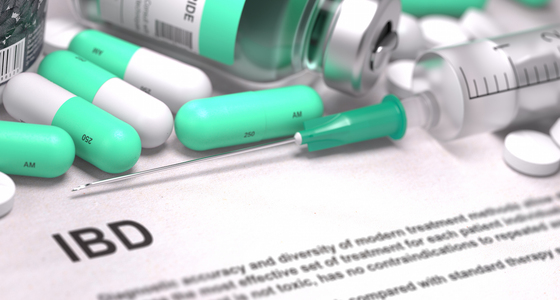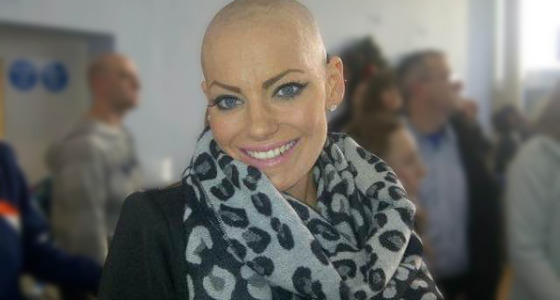Hair loss among the IBD population is more common than you think. In this article we take a look at why you might experience hair loss with Crohn's disease or ulcerative colitis.
Hair loss among people with inflammatory bowel disease (IBD) is more common than you might think. In a study1 published in 2015, around a third of patients that took part reported a history of some kind of hair loss.
Plus, a 2021 research2 review evaluating the association between alopecia, a type of hair loss, and IBD suggests a connection between the two. It also suggests that hair loss may be more common in people with IBD than in the general population.
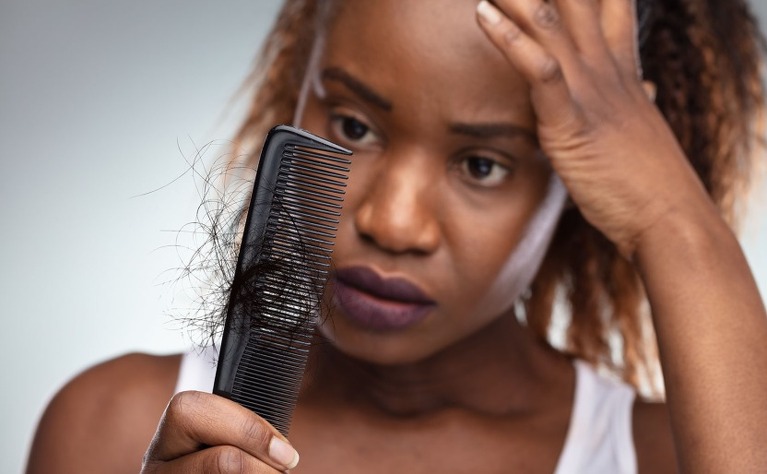
Despite its prevalence the causes of hair loss in IBD patients are complex and vary from person to person, as does the amount of hair that is lost. More research is needed to explore the connection further.
Below is a summary of some of the reasons it is thought hair loss can happen in people with IBD. If you experience hair loss you should speak to your doctor as the reasons behind hair loss can be very individual and identifying the cause cannot always be possible.
Anecdotally people with IBD have reported hair loss when taking some medications to treat IBD. However, there have been no in depth studies carried out in this area.
Common side effects listed for both mesalazine and methotrexate include hair loss. However, in the study1 mentioned earlier in this article mesalazine and anti-TNF medications were associated with lower odds of hair loss. Talk to your doctor if you are worried.
Certain medications, such as anticoagulants or beta-blockers may also cause hair thinning.
In alopecia areata hair is lost from some or all parts of the body usually in clumps or patches. It is believed to be an autoimmune condition. Studies3 report that alopecia areata onset and progression is strongly influenced by the immune system. IBD is an immune-mediated condition and if you have IBD you have an increased risk of developing an autoimmune condition.4
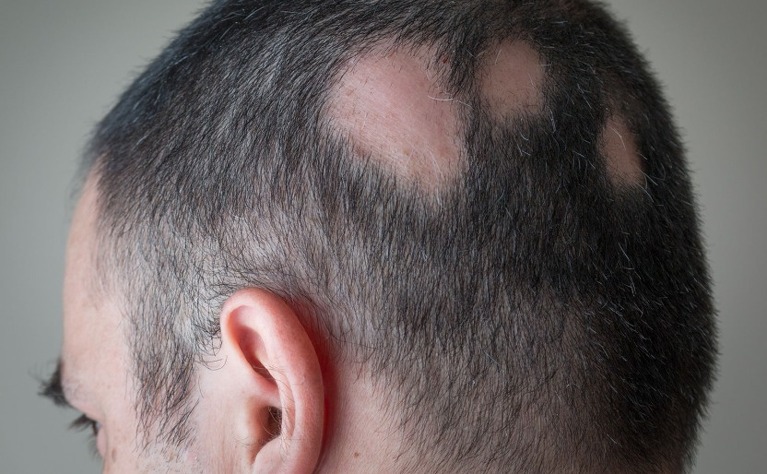
If your body has been under intense emotional or physical stress or changes then you can experience hair loss as a response to this, known as telogen effluvium - a common type of alopecia involving thinning of the hair on your scalp (most commonly on the top of your head) rather than specific bald patches. You may feel your hair is thinning, but you are unlikely to have areas of total hair loss and other body hair isn’t usually affected.
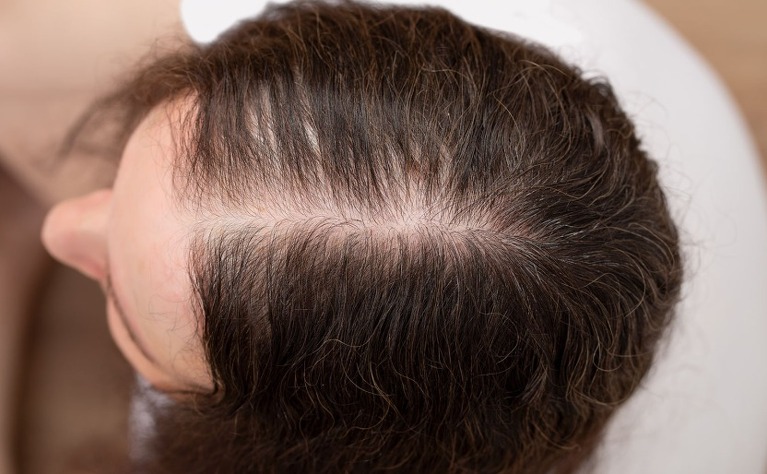
Your hair has three stages of growth; anagen (growth), catagen (resting) and telogen (shedding). Telogen effluvium affects your hair when it’s in the telogen stage. Following a stressor or change to your body, up to 70% of your hair in the anagen stage prematurely enters the shedding (telogen) stage, which subsequently causes hair loss.
Telogen effluvium can be caused by your body reacting to:
hormonal changes, such as those that take place when a woman is pregnant
intense emotional stress
intense physical stress, such as childbirth
trauma to the body including surgery
a short-term illness, such as a severe infection
a long-term illness, such as IBD or liver disease
changes in your diet, such as crash dieting
This type of hair loss tends to occur two to three months following a stressor or change to your body and in most cases is temporary. Hair typically grows back in three to six months without treatment.
IBD can prevent the proper absorption of nutrients in the gut, resulting in nutritional deficiencies such as B12 and iron. These deficiencies can result in hair loss. If you aren’t able to get these nutrients from your food then you should talk to your doctor before you start taking any dietary supplements and do not take over the daily recommended amount. It’s been reported that overly high doses of certain vitamins can also cause hair loss.5 In particular, excessive amounts of fat-soluble vitamins like vitamin A, where the body takes what it needs and stores the rest for later use, can cause hair loss. Excessive intake of mineral supplements like zinc and selenium6 have been linked to hair loss too.
Various medications are available to try to treat hair loss, however they are not effective for all types of hair loss. It’s important to remember that in most cases, given time, the hair will start to regrow. As is the case with telogen effluvium, hair typically grows back in three to six months without treatment.
You can read more about the options available in the UK for dealing with hair loss here.
For the U.S, the American Academy of Dermatology has suggested methods of helping hair loss relating to alopecia areata or alopecia totalis. These treatments include topical or injected corticosteroids, Rogaine (minoxidil), anthralin cream, or even immunotherapy.
The American Academy of Dermatology has some tips for managing hair loss:
Wash and condition your hair without damaging it. Hair that’s thinning or falling out is fragile and easily damaged. Use gentle shampoo and conditioners
After washing your hair, wrap it in a microfibre towel to help it dry more quickly. This helps reduce the time you spend blow-drying
Stop at-home perming, colouring and chemical straightening and relaxing. Go to a reputable specialist service for these hair treatments
Limit your use of heated hair styling appliances like hair straighteners
Use the lowest heat setting on your blow-dryer. When possible, let your hair dry naturally rather than using a blow-dryer
Limit wearing your hair in a hairstyle that pulls tightly on your hair as it can cause a type of hair loss called traction alopecia
Brush or comb your hair gently. Tugging on your hair while brushing or combing it can lead to hair loss
Stop smoking. Smoking causes inflammation throughout the body, which can exacerbate hair loss
Whatever the reasons, losing your hair can be distressing and difficult to live with. If you need emotional support following hair loss, you can contact the charity Alopecia UK. A network of support groups exists across the UK where you can talk to other people with alopecia. In the U.S, the National Alopecia Areata Foundation (NAAF) provides resources and details of local support groups.
1.Rajesh Shah, Bincy Abraham, Jason Hou, and Joseph Sellin. Frequency and associated factors of hair loss among patients with inflammatory bowel disease. World J Gastroenterol. 2015 Jan 7; 21(1): 229‐232. PMCID: PMC4284339.
2. Jalal Maghfour, Justin Olson, Rosalynn R Z Conic, Natasha Atanaskova Mesinkovska. The Association between Alopecia and Inflammatory Bowel Disease: A Systematic Review and Meta-Analysis. PMID: 33440387
3.Teontor Simakou, John P Butcher, Stuart Reid, Fiona L Henriquez. Alopecia areata: A multifactorial autoimmune condition. PMID: 30558963 DOI: 10.1016/j.jaut.2018.12.001
4. J Claire Wilson, Raoul I Furlano, Susan S Jick, Christoph R Meier. Inflammatory Bowel Disease and the Risk of Autoimmune Diseases. PMID: 26507860 DOI: 10.1093/ecco-jcc/jjv193
5. D. H. Rushton. Nutritional factors and hair loss. Clinical and Experimental Dermatology, Volume 27, Issue 5, 1 July 2002, Pages 396–404. CED: https://doi.org/10.1046/j.1365-2230.2002.01076.x
6. Jennifer K MacFarquhar, Danielle L Broussard, Paul Melstrom, Richard Hutchinson, Amy Wolkin, Colleen Martin, Raymond F Burk, John R Dunn, Alice L Green, Roberta Hammond, William Schaffner, Timothy F Jones. Acute selenium toxicity associated with a dietary supplement. PMCID: PMC3225252
